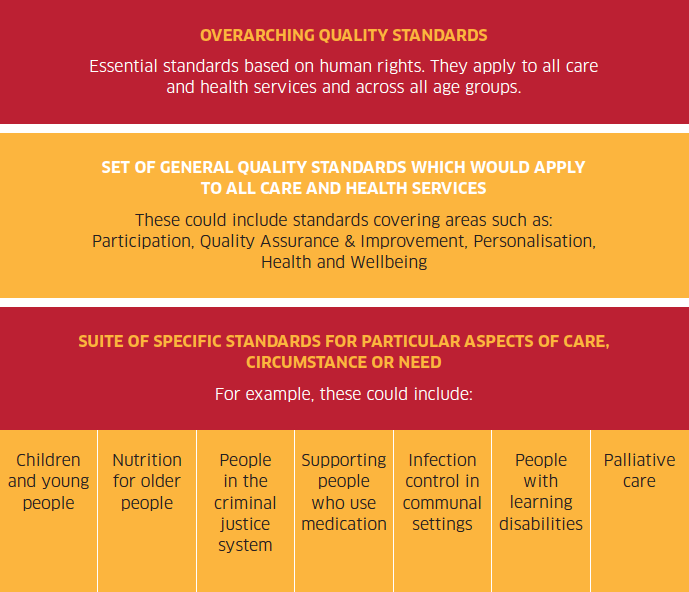National Care Standards Review
Almost all of us will use a care service at some point in our lives. This consultation asks you to play your part in shaping the quality standards for services that the people of Scotland deserve.
2. A new structure for the National Care Standards
New standards could be structured in different ways. Based on the conversations we have been having over the last few months, we propose the following model. Examples of how these could be set out are given later in this consultation paper.

When thinking about a possible model for new standards, people told us that the current structure of 23 different care standards is confusing and should be streamlined so that people receiving care can more easily understand what to expect and service providers can more easily deliver high quality care.
Under this model, overarching quality standards, based on human rights law and standards, would set out the essential requirements that should be core to any service - such as dignity, equality, fairness, respect, the best interest of the child and children's evolving capacities. They would describe elements of a quality care experience rather than requirements that are specific to a particular service type. We think this would help health and care services improve.
These overarching quality standards would apply across all age groups and would set out clear quality thresholds below which standards of care should not fall. This would be a similar approach to GIRFEC - which applies to anyone supporting children and young people and their families - and Standards of Care for Dementia, which apply to everyone with a diagnosis of dementia across all health and social care settings.
A set of general standards would sit below the overarching quality standards and cover areas relevant to all health and care services, for example, participation, quality assurance and improvement, personalisation and health and wellbeing.
We propose that general standards set out both the essential requirements which anyone using a service can expect and the aspirational elements which promote improvement.
A suite of specific standards that apply to particular groups of people or particular types of service would sit underneath the general standards. This would include clinical standards where appropriate.
There would be clear links between these three tiers to show how the overarching quality standards guide the way services are delivered. The aim is to simplify, align and reduce overlap whilst ensuring the standards drive improvement.
The overarching quality standards will complement the national outcomes for adult health and wellbeing and the SHANARRI[5] outcomes for children and young people. The overarching quality standards relate to individual service providers; the national outcomes relate to the overall health and wellbeing of the population.
Question 2
a. Do you agree that overarching quality standards should be developed for all health and social care in Scotland?
Yes No Don't know
Comments
b. Do you agree that the overarching quality standards should set out essential requirements based on human rights?
Yes No Don't know
Comments
c. Do you agree that the current National Care Standards should be streamlined and a set of general standards developed that would sit below the overarching standards and apply to all services?
Yes No Don't know
Comments including any areas you think should be included in the general standards.
d. Do you think general standards should set out essential requirements and aspirational elements?
Yes No Don't know
Comments
e. Do you agree that a suite of specific standards are developed for particular aspects of care, circumstances or need?
Yes No Don't know
Comments including any specific standards you think should be included.
Contact
There is a problem
Thanks for your feedback